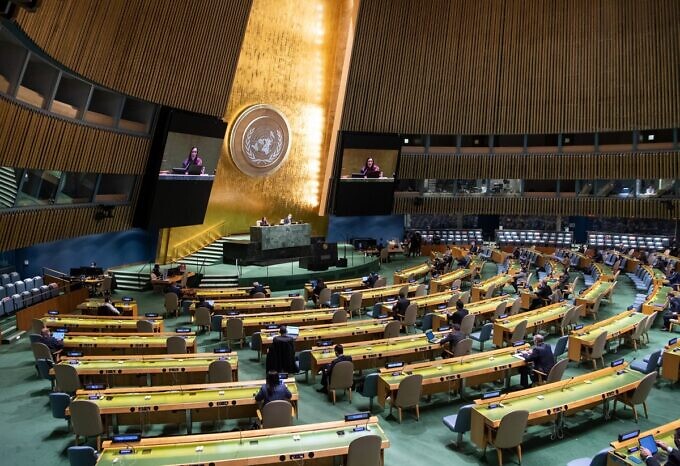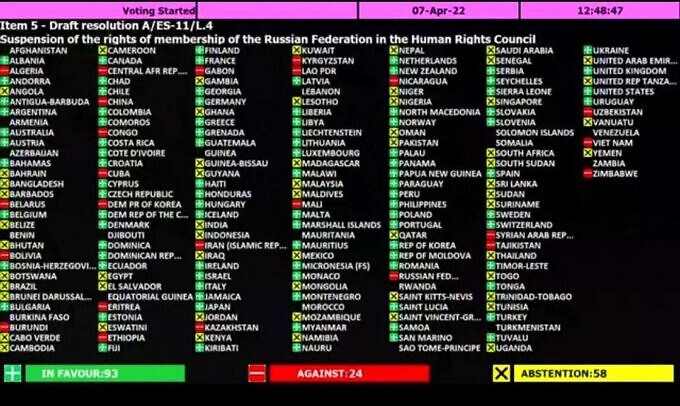
General Assembly hall an the UN headquarters in New York city. Photo: UN.

Orinoco Tribune – News and opinion pieces about Venezuela and beyond
From Venezuela and made by Venezuelan Chavistas

General Assembly hall an the UN headquarters in New York city. Photo: UN.
The UN General Assembly voted on Thursday, April 7, to suspend Russia from the UN Human Rights Council. The move follows accusations against the Russian military of killing civilians in the Ukrainian city of Bucha. The accusations were repeatedly denied by Moscow and have not been independently verified. The resolution was approved with 93 votes in favor, 24 against, and 58 abstentions.
Among Latin American countries, Bolivia, Cuba, and Nicaragua voted against the decision, while Brazil, El Salvador and Mexico abstained. Venezuela did not vote. The rest of the countries in the region supported the decision, including Argentina, Chile, Peru, and Honduras, to the surprise of some analysts.
China, as well as Iran, Algeria, Ethiopia, and Kazakhstan, were also among the countries that did not support the suspension.
Venezuela was unable to vote, as journalist Érika Ortega explained on her Twitter account, as a result of the unilateral coercive measures or “sanctions” imposed against the country by the United States and Europe. “After the sanctions, the banks do not process the money that the Republic has, and that has been marked by the (Venezuelan) government for that purpose,” she explained.
However, Samuel Moncada, Venezuela’s ambassador to the UN, did speak at the session this Thursday, and spoke out strongly against the suspension.
“Human rights must not be instrumentalized to attack sovereign states, since such an approach undermines the very essence of the universal human rights system, associated with guaranteeing the universality and enjoyment of these fundamental rights and freedoms for all, without distinction. or discrimination,” Moncada said. “The draft resolution presented today is an example of the politicization of human rights to advance national agendas and geopolitical interests.”
“Russia is an essential part in the solution of the crisis in the Eastern European region,” added Moncada, and without it “there is no possible peace agreement in Europe. Peace without Russia is an ideological mirage, a hallucination of those who believe that the time has come to achieve the definitive victory of a unipolar power. That is an ideology contrary to international peace.”
“We alert the world to the real and clear danger that the current situation in the Eastern European region will continue over time,” said Moncada, “generating consequences that will take generations to overcome. We warn about the expanding effects around the world, especially in the living conditions of the most vulnerable sectors of each country … caused by the interruption of supply chains.”

Moncada also warned “about the start of a new arms race that threatens to divert resources to war that should be used for development and the fight against poverty,” as well as the existence of “forces that encourage a clash of blocs, with the false illusion of a definitive unipolar victory, a clash that will cause a world conflict between nuclear powers, which will destroy humanity as we know it today.” For these reasons, Moncada urged that nations work to reduce tensions and seek peaceful resolutions.
Cuba’s ambassador to the UN, Pedro Luis Pedroso, reiterated part of his speech in a tweet posted on his Twitter account: “Will this Assembly ever be able to pass a resolution suspending US membership in the Human Rights Council, to give just one example? We all know that this has not happened and will not happen, despite its flagrant and massive violations of human rights.”
Cuba: "It is Russia today—but tomorrow it could be any of our countries, especially nations of the South which do not support the interests of domination.." @PedroPedrosoC pic.twitter.com/02yeyV04kL
— Kawsachun News (@KawsachunNews) April 7, 2022
Kawsachun News posted a tweet with part of the excellent Cuban diplomat’s speech, in which he said that “it is Russia today—but tomorrow it could be any of our countries, especially nations of the South which do not support the interests of domination…”
RELATED CONTENT: Staged Massacre in Bucha
In a stance similar to that of other countries that voted against the resolution or abstained, Chinese UN Ambassador Zhang Jun called for an investigation into the massacre of civilians in Bucha before making any decision. “Any accusation must be based on facts,” said Zhang Jun. “Before a full picture becomes clear, all parties must exercise restraint and avoid baseless accusations.”
This Tuesday, White House spokesperson Jen Psaki and the US permanent representative to the international organization, Linda Thomas-Greenfield, reported that Washington was seeking to suspend Moscow from the council due to its military operation in Ukraine. “Russia should not have a position of authority in that body, nor should we allow Russia to use its seat on the Council as a propaganda tool to suggest that it has a legitimate human rights concern,” Thomas-Greenfield said, as representative of the country that has violated human rights the most in the history of humanity.
In return, Russia’s representative to the UN, Vasily Nebenzya, called a press conference last Monday to present Moscow’s position on the murders that occurred in Bucha, and described as “unimaginable ” the fact that Washington attempted to persuade others to suspend the Eurasian country from the UN Human Rights Council and exclude it from various multilateral forums. “We cannot believe what the West and its allies are currently trying to do,” the diplomat said. “This fact is unprecedented, it will not facilitate or help what is happening between Russia and Ukraine.”
For his part, Stéphane Dujarric, spokesperson for the secretary general of the United Nations, António Guterres, stated earlier that Moscow’s expulsion from the forum would create “a dangerous precedent.”
• The Human Rights Council is an intergovernmental body within the United Nations system, made up of 47 states and responsible for the promotion and protection of human rights throughout the world.
• A resolution adopted in March 2006 established the Human Rights Council, and says that the General Assembly has the right to suspend a country’s membership if it “commits serious and systematic violations of human rights.”
• The only time that the UN General Assembly suspended the membership of a state in the Council was in 2011, when the participation of Libya was discussed, in response to the alleged violence of the government of Muammar Gaddafi against protesters in that African country. Moscow supported the suspension then, during Dmitri Medvedev’s administration.
• The Human Rights Council has been subject to various criticisms. Thus, in 2018, the then US ambassador to the UN, Nikky Haley, branded the body “hypocritical” and “a protector of human rights abusers and a sink for political bias” for its “unfair criticism” towards Israel. She announced that Washington would end its membership, though she later changed her mind.
• Between 2017 and 2019, Russia was not part of the Council. This was due to the fact that it lost the elections, which took place in October 2016. At that time it obtained 112 votes and was surpassed by Hungary and Croatia, with 144 and 114 votes, respectively.
Featured image: General Assembly hall in the UN headquarters in New York City. Photo: UN.
(Alba Ciudad) with Orinoco Tribune content
Translation: Orinoco Tribune
OT/JRE/SL